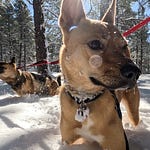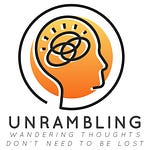Have you ever been out by yourself when you have this amazing idea—but by the time you get home, it’s gone?
It’s like waking from a dream, knowing you had something important you NEEDED to write down, but you just can’t remember what it was.
That’s why I started UnRambling—to capture those fleeting ideas before they disappear.
Hi! My name is Sean Openshaw, and welcome to UnRambling—where I record myself while [running, biking, hiking, walking, driving]… or swimming—well, maybe not swimming.
I then transcribe and reflect on the recording to preserve the insights often left out on the trail.
Through this process, I’ve learned that saying thoughts out loud can be even more powerful than just thinking about them or even writing them down.
And I hope that by doing this, I inspire you to try it, as well.
Today is Wednesday, February 26, 2025. I’m out walking my three dogs in the forest behind my house.
Today, I'm Looking for the Voice of UnRambling
It’s official: I just published my first two UnRambling podcasts on Spotify. Yah!
In those episodes I talked about getting more comfortable with my voice.
Speaking naturally and refining how I express my thoughts out loud has been an ongoing challenge, but ultimately, the goal of UnRambling isn’t just about ME finding my voice. It’s about providing real value to an audience.
That BIG PICTURE is what I’m thinking about today: How can I motivate people to put down their cameras, pick up a pen, and explore the meaning behind the important moments in their life—beyond what they look like?
This is why I’ve been working on creating the processes and procedures, the framework and the workbook for creating a Personal Life Record.
I want to help people live, capture, and catalog important moments so they can create stories, preserve memories, and stay connected to the moments that bring meaning and purpose to their lives.
This fits into the UnRambling process because, just like their thoughts, I want to help people get their memories out of their heads and onto the page where they can reflect and preserve them.
I Want to Shift My Focus From Personal to Purposeful
While these initial UnRambling sessions have helped me define my voice and message, I realize that the long game is bigger than my own journey. The real opportunity here is to help others shift the way they think about capturing important life moments.
Instead of just accumulating images, how do we document the richness of experience? How do we ensure that the context, emotions, and meaning behind moments aren’t lost?
I want to provide people with insights, tools, and frameworks to make this process easier—questions they can ask themselves at the right time, strategies to help organize and catalog memories effectively, and a process that prevents life’s meaningful moments from getting lost in the rambling way we often document our lives.
I Want to Interview Experts in Legacy Storytelling
One potential direction for the podcast is to interview legacy story ghostwriters or legacy filmmakers—people who help others write stories, create videos, and publish memoirs about peoples’ lives.
Specifically, I believe that creating a Personal Life Record will make it significantly easier for these legacy storytellers to do their job. The hard work of cataloging someone’s life—the timelines, the relationships, the milestones, the important stories—will already be in place.
Imagine a ghostwriter sitting down to craft someone’s life story.
Instead of starting from scratch, they have a structured record of key milestones, relationships, and defining moments.
Imagine sitting down with an elderly loved one—not with just a camera and a generic list of memory prompts, but with a framework designed to ask the questions that actually matter.
Stories that unlock the real, meaningful moments—not just, then this happened, and then this happened.
Imagine sorting through your own life, coming across an important date or fact, and knowing exactly where to document it so it doesn’t slip away into the void of forgotten details.
This changes everything.
Even beyond professional memoirs, this process benefits families. How many times have you wished you had more details about your grandparents’ lives?
How many times have you heard a story or stumbled across an important detail or reflection about your life, and you just didn't know where to put it—and then it was forgotten months later?
How much easier would it be for children and grandchildren to understand their family history if everything was organized and documented in one place?
And I’m not just talking about genealogy spreadsheets.
These insights—this structure—could be invaluable in understanding how memory preservation aids in writing memoirs and life stories.
Facts and details are the guardrails that keep our memories from crashing into the ditch.
Beyond that, there’s an urgent need to talk about the importance of capturing stories before it’s too late—before memory fades, before dementia sets in.
The act of celebrating someone’s story while they are alive and can still fully engage in the process is something I want to explore more deeply.
The moment I knew this was what I was meant to do started with creating a life story about my grandmother BEFORE she passed away. She wanted to be at her 90th birthday when we presented a legacy film about her life. She wanted to be there, to feel the love, when we told everyone HER story. She wanted to experience the celebration while she was still alive and didn’t want to miss it “just because she happen to be dead.”
Those were her words.
And I’ll never forget what that felt like—seeing her surrounded by her family, my brothers and sisters, aunts, uncles, cousins—all the children and great grandchildren. She beamed from ear to ear as we watched her story unfold on the big screen.
The biggest challenge wasn’t scanning in all the photos from her scrapbooks and albums for the video—but trying to get the stories and details behind the images that were often more faded than photos themselves.
That’s when I realized the frailty of memory. That’s when I realized the lie I’d been chasing as a professional photographer for the past 30 years.
There’s more to a moment than meets the eye.
And the “1,000 words” that photographs profess to capture—don’t even scratch the surface of the real words that need to be preserved.
I’m Aligning UnRamblings with My Book and Personal Life Record
Another key realization is that UnRambling should align with the chapters of my planned book and my continued work on Personal Life Record.
By syncing podcast episodes with blog posts and book topics, I can explore problems and solutions—start conversations that can help more people and will build on itself over time.
A big part of this process involves understanding what people are already doing, where the gaps lie, and how I can enhance and guide the conversation.
This isn’t just about me sharing what I know—it’s about engaging with others, crowdsourcing insights, and refining strategies together.
The Next Evolution of UnRambling
As I wrap up today’s UnRambling, the takeaway, for me, is clear:
I’m sure it’s exhausting for an audience to have to listen to me—non-stop, documenting my self-improvement journey.
I’m sure I’ll continue to talk about it, but the direction of this podcast is going to shift.
The real purpose of UnRambling is to help others rethink how they capture and preserve life’s important moments—to go beyond what moments look like and create a system for organizing, reflecting on, and making sense of what they mean.
Unrambling the rambling way we tend to document our lives.
Getting our thoughts and memories out of our heads—out of our hearts—and onto the page where they can help our future selves and our loved ones understand and experience our story - before it’s too late.
So, if you were to sit down to write your life story or a memoir about an important moment in your life, where would you start?
Beyond just photographs, would you have the details you need?
Would you be able to see the connections between the events that shaped you into the person you are today—how you’ve changed—how you’ve grown over the years?
What are your current pain points when it comes to preserving your memories—your story?
What are you doing now? What is/isn’t working?
These are some of the conversations I want to start having with people.
This is my challenge to you: Take a few minutes after this episode, pull up a photo from an important moment a few months ago, and write down details that the photograph didn’t capture.
If this photo was in a photo album 50 years from now, would your distant relative have a clue about the significance of that moment—the rich details—the story behind the image—beyond what they could see?
Beyond the game of charades that photographs play with the memories we’ve entrusted them to preserve.
What did you hope you never wanted to forget about that moment?
What did you hope you would always remember?
What prompted you to pull out your camera?
The world doesn’t need one more person teaching you how to capture what moments look like.
I want to help you preserve what moments mean.
What do you have to lose?






